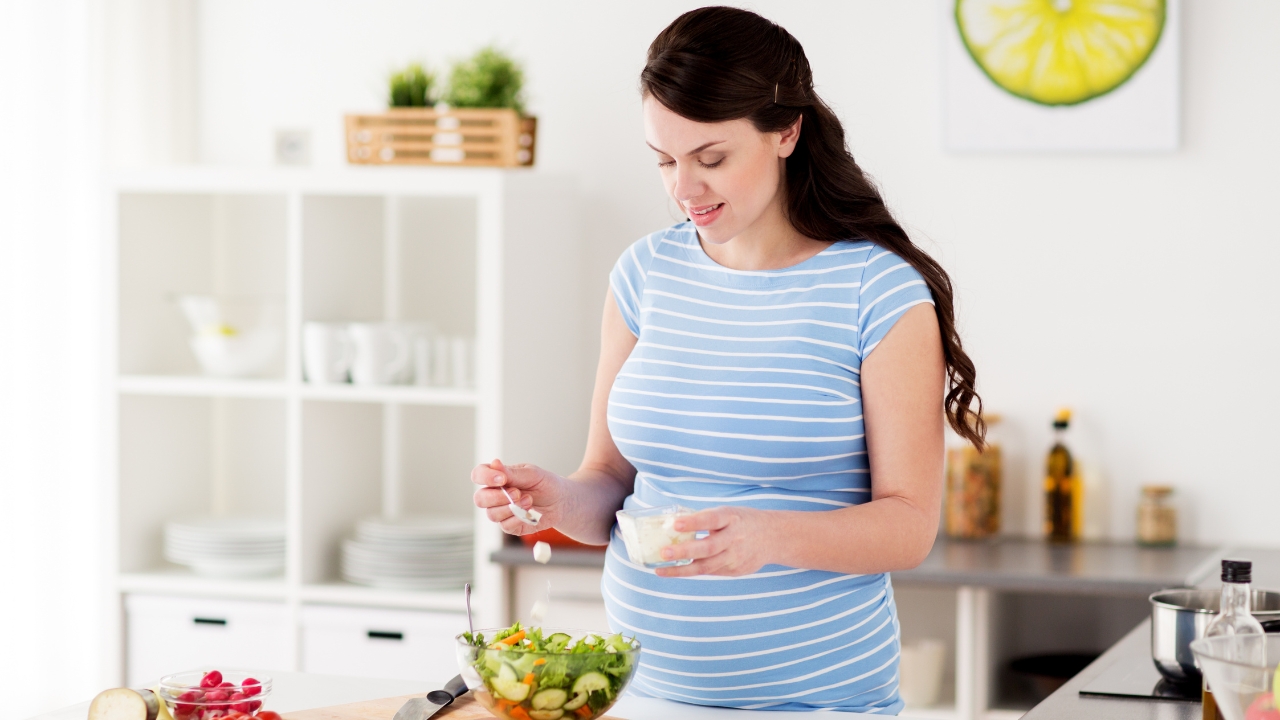 Author's opinion
Author's opinion
Drinking Diet Soda During Pregnancy: Good or Bad?

Drinking soda during pregnancy may be unsafe. Photo: Kmpzzz/shutterstock
One question that many pregnant women ask is if they can have soda or diet soda while pregnant. Soda is a source of empty calories, contributing zero nutritional value to the maternal diet, yet it may be an unsafe source of other ingredients. Ingredients in soda may include sugar, artificial sweeteners, caffeine, and high-fructose corn syrup.
So, what does the current research say about the topic? According to a study published in 2019, maternal consumption[1] of regular or diet soda may have adverse effects on maternal/infant health, including preterm birth, increased infant birth weight, and an infant’s preference for sweet foods. Even pre-conceptional maternal or paternal soda consumption may affect the infant’s health through epigenetic imprinting[2] to the germline (manipulation of the DNA on the gene).
So, let’s take a closer look at the effects of soda and diet soda on pregnancy outcomes, exploring each ingredient in detail.
Can You Drink Soda or Diet Soda During Pregnancy?
- Regular soda may contribute to excess weight gain, a problem of 48% of pregnant women.
- Soda may contain excess sugar but contains one-third less caffeine than coffee.
- Diet soda contains artificial sweeteners safe to consume in moderation; recent associations with excess maternal weight gain and infant obesity are of concern and need further study.
- Consumption of soda is associated with increased birth weight, preterm birth, and infant’s taste preferences for sweets.
- High-fructose corn syrup in regular soda is particularly unsafe for pregnant women.
- Preconception of maternal or paternal consumption of soda may harm an infant’s health through epigenetic imprinting.
Is The Caffeine In Soda Safe During Pregnancy?

How much caffeine can you have when you are pregnant? A look at the various governmental recommendations and the literature shows[3] it is generally agreed upon, with a few exceptions, that 200 mg daily is the caffeine limit during pregnancy. This is approximately two cups of coffee per day.
Approximately 70% of mothers-to-be[4] continue to ingest caffeine sources throughout their pregnancy. Caffeine sources include coffee, tea, energy drinks, soda and chocolate. Soda contains less than one-third the caffeine[5] that coffee does or anywhere from zero to 34 mg in the average cola.
Tea contains 19-47 mg of caffeine, depending on the brew. Decaffeinated tea is always an option. Energy drinks vary widely and may contain as much as 200 mg in an energy shot or 160-357 mg in a drink. Hot chocolate has about 25 mg per serving.
It is important to stick to the safety guidelines because caffeine intake has been associated[6] with poor gestational outcomes. Blood levels tend to increase as pregnancy progresses, in part due to a more prolonged half-life in the bloodstream.
Caffeine is an alkaloid that crosses the placenta, and fetal tissues lack the enzyme to break it down. It tends to decrease fetal blood flow, although the specific effects on the fetus[7] remain a puzzle.
The amount of caffeine in a soda is not usually the critical ingredient of concern when we talk to women about drinking soda while pregnant unless you read the most current literature. A 2021 study questions the safety[8] of any caffeine at all, saying it leads to stillbirths, miscarriage, small-for-gestational-age, and leukemia. This should make you pause before reaching for that caffeine buzz.
Is The Sugar In Soda Safe During Pregnancy?
How much sugar should you have per day when you plan your daily menu? You should have a goal in mind before making radical choices because you feel hungry all of the time. You feel hungry because you have a new life growing inside of you changing your metabolism and hormones; it is not a cry for sugar.
According to most guidelines[9], free added sugar should be limited to 10% of your calories. The American Heart Association recommends that no more than 6% of your calories be eaten as added sugar, equating to about 25-30 grams per day.
Sugar, a mixture of glucose and fructose, contains 4 kcal per gram. If consumed in excess[10], it can cause gestational weight gain, preterm deliveries, large-for-gestational-age babies, and gestational diabetes.
Those with gestational diabetes or GDM should avoid added sugars rather than just limit them. Sugar can have an immediate and adverse effect on blood sugar control, which is even more sensitive in gestational diabetes. In fact, you should avoid all simple carbohydrates[11] if you have GDM unless you are on insulin, and they become necessary to treat hypoglycemic episodes.
How Much Sugar Is In Soda?
Is it too much for pregnancy? One 16.9-ounce bottle of cola contains 54.5 grams[12] of sugar, more than the daily limit for most calorie levels. So, is choosing regular soda a wise choice during pregnancy?
The answer to this question is no. The sugar content of one bottle of regular soda is too high for most, although not all, calorie levels. Furthermore, studies show that intakes of sugar[13] among women whether pregnant or not, exceed the current recommended guidelines.
According to the CDC, 48% of pregnant women exceed weight gain[14] recommendations, so most do not need the extra calories from sugar.
Let’s Talk High-Fructose Corn Syrup
What else is in regular soda to worry about besides the total sucrose content? Regular soda has high-fructose corn syrup or HFCS in it, a highly processed and concentrated form of fructose. One of the problems with the consumption of this substance is that it has been shown in animal studies[15] to cause insulin resistance and high blood fat in offspring.
Maternal exposure to high fructose may lead to programmed hypertension[16]and oxidative stress in the infant as growth occurs. One research study on 3070 pregnant women found fructose damaging to pregnancy outcomes[17], whereas other sugar types were not.
Epidemiological studies also show fructose to be associated with[18] obesity, metabolic impairment, dyslipidemia, and insulin resistance. Natural fructose can be abundantly found in fruit and other foods, but what we are concerned with is HFCS, which is the real problem. The introduction of HFCS into foods in the 1970s increased daily consumption[19] from 16-20 grams/day to 60-150 grams per day, primarily from HFCS.
What About Diet Soda During Pregnancy?
With diet soda, we avoid the problem of excess sugar and high-fructose corn syrup, but what about artificial sweeteners? Recent studies report a higher incidence[20] of adverse pregnancy outcomes and infant health issues with diet soda consumption — but admit that the research is inconclusive and more study is needed.
One daily serving of a diet beverage may increase the risk[21] of having a preterm delivery by as much as 11%. Another study found that consumption of regular sodas increased preterm delivery, and diet sodas increased late-term delivery. One recent study showed[22] that the consumption of one or more diet sodas daily increased the risk of autism in the offspring.
Observational research suggests that diet soda consumption may lead to premature birth and infant obesity, but the FDA has cleared moderate consumption of artificial sweeteners as safe in pregnancy. Moderate intake is one to two 12-ounce bottles.
At this time, it appears that pregnant women should consume[23] artificial sweeteners only in moderation and with the knowledge that it may increase the risk for premature birth, infant obesity[24], or future weight issues[25] in their offspring.
Healthy Alternatives to Soda During Pregnancy
Here is a list of healthy drinks to hydrate with besides sodas while pregnant.
- Infused water: Take chopped fruit and freeze in ice cubes; add to water. Place slices of lemon, lime or oranges in your water glass for added flavor.
- Seltzer water: if you like the carbonation of soda, try drinking seltzer to get the same bubbly taste without all the sugar and chemicals.
- Add juice to seltzer or plain water: A little bit goes a long way for flavor. Mix one part juice to three parts water and use juice without sugar added. Tart juices like grape are good choices.
- Fresh vegetable juice: This tastes wonderful when made at home in a juicer. If you buy store-bought vegetable juice, opt for the low-sodium kind, as veggie juices tend to be high in sodium.
- Dairy or dairy alternatives. Be sure to get your three daily servings of dairy.
- Unsweetened coconut water: This contains a small amount of sugar, about 12 grams, so limit consumption. Avoid if you have gestational diabetes.
- Lemon-lime seltzer: This version of seltzer may curb your cravings for alcohol.
- Green tea: Tea is lower in caffeine than coffee, so an occasional cup will not hurt you.
- Plain water: There is nothing wrong with plain water. Put some flavored ice cubes in for variety. Drink 8-10 glasses[26] per day.[insert text here]
Low-Fat Smoothies: Use low-fat milk or dairy alternatives, ice cubes, vanilla flavoring, a little monk fruit for sweetening, ½ cup fresh fruit, ½ cup low-fat yogurt, and blend. Drink immediately.
Conclusion
There are many things to consider when determining the safety of soda during pregnancy. Excessive empty calories from regular soda may lead to excessive maternal weight gain, and the HFCS may pose risks to maternal/infant health. Diet soda may be an acceptable alternative, yet recent studies point to potential excess weight gain problems in the mother and infant obesity associated with its consumption.
So, further studies are needed to clarify guidelines on diet soda consumption in pregnancy. For now, the FDA says that moderate consumption of substances containing artificial sweeteners is safe, and we will have to follow the research.
In general, soda contains empty calories and contributes nothing of any benefit to the maternal diet except hydration. And water is best for hydration.
So, if you drink soda, choose a diet-decaffeinated soda in moderation. Choose diet soda only with the awareness that it is not without its potential risks, which are just now being seen in research.
Frequently Asked Questions
According to the FDA, moderate consumption of artificially sweetened beverages is safe. More recent studies have pointed to associations between diet soda and infant obesity, autism[27], and excess maternal weight gain.
The total amount of sugar is excessively high. It contains high-fructose corn syrup, which is associated with metabolic abnormalities, obesity, and hypertension. The calories are empty calories, contributing zero nutritional value to the maternal diet.
The caffeine in soda is only one-third of that in a cup of coffee. While excess caffeine is harmful, current guidelines allow 200 mg daily. Recent studies question this guideline, saying any caffeine may have adverse outcomes.
It is inadvisable to drink regular soda before or during pregnancy by the mother. The father shouldn’t drink soda pre-conceptually due to genetic changes to the germ cell line that occur during conception.
Take care with energy drinks as they often contain way too much sugar and caffeine, along with herbs that you should not have when you are pregnant.
Resources
MANA adheres to strict sourcing guidelines, avoids most tertiary sources, and uses only professional resources updated to contain accurate and current information. We majorly rely on peer-reviewed studies, academic research from reputable medical associations. For more information regarding our editorial process, please refer to the provided resources.
- Goran, M.I., Plows, J.F. and Ventura, E.E. (2018). Effects of consuming sugars and alternative sweeteners during pregnancy on maternal and child health: evidence for a secondhand sugar effect. Proceedings of the Nutrition Society, [online] 78(3), pp.262–271. doi:https://doi.org/10.1017/s002966511800263x.
- Goran, M.I., Plows, J.F. and Ventura, E.E. (2018). Effects of consuming sugars and alternative sweeteners during pregnancy on maternal and child health: evidence for a secondhand sugar effect. Proceedings of the Nutrition Society, [online] 78(3), pp.262–271. doi:https://doi.org/10.1017/s002966511800263x.
- María Rosario Román-Gálvez, Martín-Peláez, S., Loreto Hernández-Martínez, Cano-Ibáñez, N., Rocío Olmedo-Requena, Juan Miguel Martínez-Galiano, Bueno-Cavanillas, A. and Amezcua-Prieto, C. (2022). Caffeine Intake throughout Pregnancy, and Factors Associated with Non-Compliance with Recommendations: A Cohort Study. Nutrients, [online] 14(24), pp.5384–5384. doi:https://doi.org/10.3390/nu14245384.
- Qian, J., Chen, Q., Ward, S.M., Duan, E. and Zhang, Y. (2020). Impacts of Caffeine during Pregnancy. Trends in endocrinology and metabolism, [online] 31(3), pp.218–227. doi:https://doi.org/10.1016/j.tem.2019.11.004.
- Berggren, T., Buettner, D., Grim, K., Jialal, G., Jones, A., Scherr, R. and Zidenberg-Cherr, S. (n.d.). Nutrition and Health Info Sheet: Caffeine For Health Professionals. [online] Available at: https://cns.ucdavis.edu/sites/g/files/dgvnsk416/files/inline-files/fact-pro-caffeine.pdf [Accessed 11 May 2024].
- María Rosario Román-Gálvez, Martín-Peláez, S., Loreto Hernández-Martínez, Cano-Ibáñez, N., Rocío Olmedo-Requena, Juan Miguel Martínez-Galiano, Bueno-Cavanillas, A. and Amezcua-Prieto, C. (2022). Caffeine Intake throughout Pregnancy, and Factors Associated with Non-Compliance with Recommendations: A Cohort Study. Nutrients, [online] 14(24), pp.5384–5384. doi:https://doi.org/10.3390/nu14245384.
- Choi, H., Koo, S. and Park, H.-Y. (2020). Maternal coffee intake and the risk of bleeding in early pregnancy: a cross-sectional analysis. BMC pregnancy and childbirth, [online] 20(1). doi:https://doi.org/10.1186/s12884-020-2798-1.
- Qian, J., Chen, Q., Ward, S.M., Duan, E. and Zhang, Y. (2020). Impacts of Caffeine during Pregnancy. Trends in endocrinology and metabolism, [online] 31(3), pp.218–227. doi:https://doi.org/10.1016/j.tem.2019.11.004.
- Casas, R., Sara Castro Barquero and Estruch, R. (2020). Impact of Sugary Food Consumption on Pregnancy: A Review. Nutrients, [online] 12(11), pp.3574–3574. doi:https://doi.org/10.3390/nu12113574.
- Goran, M.I., Plows, J.F. and Ventura, E.E. (2018). Effects of consuming sugars and alternative sweeteners during pregnancy on maternal and child health: evidence for a secondhand sugar effect. Proceedings of the Nutrition Society, [online] 78(3), pp.262–271. doi:https://doi.org/10.1017/s002966511800263x.
- Medlineplus.gov. (2018). Gestational diabetes diet: MedlinePlus Medical Encyclopedia. [online] Available at: https://medlineplus.gov/ency/article/007430.htm [Accessed 11 May 2024].
- Usda.gov. (2024). FoodData Central. [online] Available at: https://fdc.nal.usda.gov/fdc-app.html#/food-details/2346111/nutrients [Accessed 11 May 2024].
- Cioffi, C.E., Figueroa, J. and Welsh, J.A. (2018). Added Sugar Intake among Pregnant Women in the United States: National Health and Nutrition Examination Survey 2003-2012. Journal of the Academy of Nutrition and Dietetics, [online] 118(5), pp.886-895.e1. doi:https://doi.org/10.1016/j.jand.2017.10.021.
- Anon, (2024). Weight Gain During Pregnancy. [online] Available at: https://www.cdc.gov/reproductivehealth/maternalinfanthealth/pregnancy-weight-gain.htm [Accessed 11 May 2024].
- Ando, Y., Yamada, H., Eiji Munetsuna, Yamazaki, M., Kageyama, I., Atsushi Teshigawara, Nouchi, Y., Fujii, R., Mizuno, G., Nao Sadamoto, Ishikawa, H., Suzuki, K., Hashimoto, S. and Ohashi, K. (2022). Maternal high-fructose corn syrup consumption causes insulin resistance and hyperlipidemia in offspring via DNA methylation of the Pparα promoter region. The Journal of nutritional biochemistry, [online] 103, pp.108951–108951. doi:https://doi.org/10.1016/j.jnutbio.2022.108951.
- Jia, G., Hill, M.A. and Sowers, J.R. (2019). Maternal Exposure to High Fructose and Offspring Health. Hypertension, [online] 74(3), pp.499–501. doi:https://doi.org/10.1161/hypertensionaha.119.13017.
- Goran, M.I., Plows, J.F. and Ventura, E.E. (2018). Effects of consuming sugars and alternative sweeteners during pregnancy on maternal and child health: evidence for a secondhand sugar effect. Proceedings of the Nutrition Society, [online] 78(3), pp.262–271. doi:https://doi.org/10.1017/s002966511800263x.
- Nouchi, Y., Eiji Munetsuna, Yamada, H., Yamazaki, M., Ando, Y., Mizuno, G., Miyuki Ikeya, Kageyama, I., Takuya Wakasugi, Atsushi Teshigawara, Hattori, Y., Tsuboi, Y., Ishikawa, H., Suzuki, K. and Ohashi, K. (2023). Maternal High-Fructose Corn Syrup Intake Impairs Corticosterone Clearance by Reducing Renal 11β-Hsd2 Activity via miR-27a-Mediated Mechanism in Rat Offspring. Nutrients, [online] 15(9), pp.2122–2122. doi:https://doi.org/10.3390/nu15092122.
- Dornas, W.C., de, G., Pedrosa, M.L. and Silva, M.E. (2015). Health Implications of High-Fructose Intake and Current Research. Advances in nutrition, [online] 6(6), pp.729–737. doi:https://doi.org/10.3945/an.114.008144.
- Goran, M.I., Plows, J.F. and Ventura, E.E. (2018). Effects of consuming sugars and alternative sweeteners during pregnancy on maternal and child health: evidence for a secondhand sugar effect. Proceedings of the Nutrition Society, [online] 78(3), pp.262–271. doi:https://doi.org/10.1017/s002966511800263x.
- Goran, M.I., Plows, J.F. and Ventura, E.E. (2018). Effects of consuming sugars and alternative sweeteners during pregnancy on maternal and child health: evidence for a secondhand sugar effect. Proceedings of the Nutrition Society, [online] 78(3), pp.262–271. doi:https://doi.org/10.1017/s002966511800263x.
- Sharon Parten Fowler, Gimeno, D., Swartz, M.D., Paula Stigler Granados, Lynne Parsons Heilbrun and Palmer, R.F. (2023). Daily Early-Life Exposures to Diet Soda and Aspartame Are Associated with Autism in Males: A Case-Control Study. Nutrients, [online] 15(17), pp.3772–3772. doi:https://doi.org/10.3390/nu15173772.
- Pope (2014). Sugar substitutes during pregnancy. Canadian family physician Medecin de famille canadien, [online] 60(11). Available at: https://pubmed.ncbi.nlm.nih.gov/25392440/ [Accessed 11 May 2024].
- Azad, M.B., Sharma, A.K., Russell, Dolinsky, V.W., Becker, A.B., Mandhane, P.J., Turvey, S.E., Subbarao, P., Lefebvre, D.L. and Sears, M.R. (2016). Association Between Artificially Sweetened Beverage Consumption During Pregnancy and Infant Body Mass Index. JAMA pediatrics, [online] 170(7), pp.662–662. doi:https://doi.org/10.1001/jamapediatrics.2016.0301.
- João Ricardo Araújo, Martel, F. and Keating, E. (2014). Exposure to non-nutritive sweeteners during pregnancy and lactation: Impact in programming of metabolic diseases in the progeny later in life. Reproductive toxicology, [online] 49, pp.196–201. doi:https://doi.org/10.1016/j.reprotox.2014.09.007.
- Montgomery, K.S. (2002). Nutrition Column An Update on Water Needs during Pregnancy and Beyond. PubMed, [online] 11(3), pp.40–2. doi:https://doi.org/10.1624/105812402×88830.
- Sharon Parten Fowler, Gimeno, D., Swartz, M.D., Paula Stigler Granados, Lynne Parsons Heilbrun and Palmer, R.F. (2023). Daily Early-Life Exposures to Diet Soda and Aspartame Are Associated with Autism in Males: A Case-Control Study. Nutrients, [online] 15(17), pp.3772–3772. doi:https://doi.org/10.3390/nu15173772.





